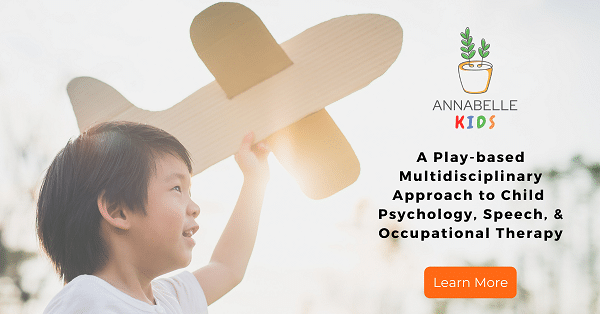Caregivers of Children with Autism
Contributed by: Annabelle Kids
Contributed by: Julia Khaw from Annabelle Kids

Flight attendants making their routine announcement, “In the event of changes in cabin pressure, put your oxygen mask on first before helping others”. Arguably, the idea is simple: we cannot support others without first taking care of ourselves.
For caregivers of children with autism spectrum disorder (ASD), this may seem counterintuitive. After all, children with special needs require greater care and attention. In fact, over 70% of children with ASD have another condition, including attention-deficit hyperactivity disorder (ADHD), depression, anxiety, epilepsy, and sleep disorders. Burnout seems like part of the package.
It is typical to see parents overcome with feelings of guilt, anger, loneliness, helplessness, and lost sense of self. Even more confusing are the conflicting emotions, one day love, pride, hope and the next resentment, shame, and grief. By sheer will and perhaps parental instinct, they set these feelings aside. What use can feelings do anyway? But the brain remembers. Chronic stress can lead to depression, anxiety, vascular diseases, lower immunity, obesity, digestive issues, substance use. These in turn, can open a whole other can of worms.
The psychological well-being of parents or caregivers of children with ASD are not openly discussed enough. Here are some tips to cope with some of the emotional challenges in caregiving.
1. Practice self-compassion
Sometimes, we can be so hard on ourselves. We may even use words on ourselves that we’d never repeat to those in the same position. Be kind to yourself, you are already doing what you think is best, given your capacities and limitations. Our culture may have deterred self-compassion as being indulgent on self pity. In reality, self compassion turns us towards acknowledging and accepting our inadequacies, failures, and afflictions. There is some comfort in the universality of sufferings and that’s okay too. Our sufferings don’t have to be who we are.
2. Use pockets of time
“No time” and its variants are probably one of the most resistant fallacies we learnt in adulthood. For many reasons this appeals to us- to cope with life demands, to escape social obligations, to convince ourselves and others of the unremarkable lives we have after all. All of which are valid. Yet, five minutes of down time for ourselves, is that unrealistic? It doesn’t have to be “a ME day” or “none at all”. There is no expiry date in caregiving for children with ASD. As they grow older, different challenges will emerge.
Find pockets of time to unwind and incorporate that into your child’s routine. This can be effortful initially, but we are looking into surviving the marathon, not the sprint. These pockets of time can be a few minutes to hours, depending on your child’s level of independence. Use this time to process your thoughts and feelings in a non-judgmental way. Some ugly things may come up, learn to accept and detach from them. Like waves that wash up the shores and return to the sea.
3. Reach out for support
Join support groups for parents of children with special needs. Yes, it can be intimidating to share our vulnerability to strangers. You might be surprised to find that others have as little clue as you do. The premise of support groups is simply common interest. Being connected to other parents of neurodiverse children can be a breath of fresh air. It can be empowering to receive mutual support and encouragement, share insights and tips, and exchange empathetic understanding. Together with existing support system, such as family and friends, employer, school, it can help to alleviate some stress.
If you have hesitation to reach for support, use your down time to explore the feelings and thoughts behind this. It is common for parents to experience shame, wanting to protect their child from societal norms which can sometimes be unforgiving. When you feel ready, there are professional support like psychological services to help you navigate.
4. Be informed about early intervention
It is equally important to be practical by being informed and updated about early intervention. Early intervention capitalizes on the malleability of the young brain (or neuroplasticity), which is fundamental for learning. Enriching the child’s environment at a young age, e.g. through social engagement like play and communication, has been suggested to help recalibrating neural connectivity1. Intervention for autism relies heavily on behavioral therapy. In a nutshell, this means reinforcement and punishment, but more accurately, in the context of ASD, it involves social cognition. This includes eye contact, empathy, joint attention, subtleties of communication and interaction, all of which are the neurodevelopmental deficits of ASD. Behavioral techniques are merely the oars of the boat to reach a destination. They are grounded in scientific theories and have shown effectiveness in changing maladaptive behaviors.
It is essential for parents to balance self-care and resourcefulness in order to avoid emotional burnout. Remember, in the event of changes in cabin pressure, put your oxygen mask on first before helping others.
References
1. Sullivan, K., Stone, W. L., & Dawson, G. (2014). Potential neural mechanisms underlying the effectiveness of early intervention for children with autism spectrum disorder. Research in developmental disabilities, 35(11), 2921-2932. https://doi.org/10.1016/j.ridd.2014.07.027


